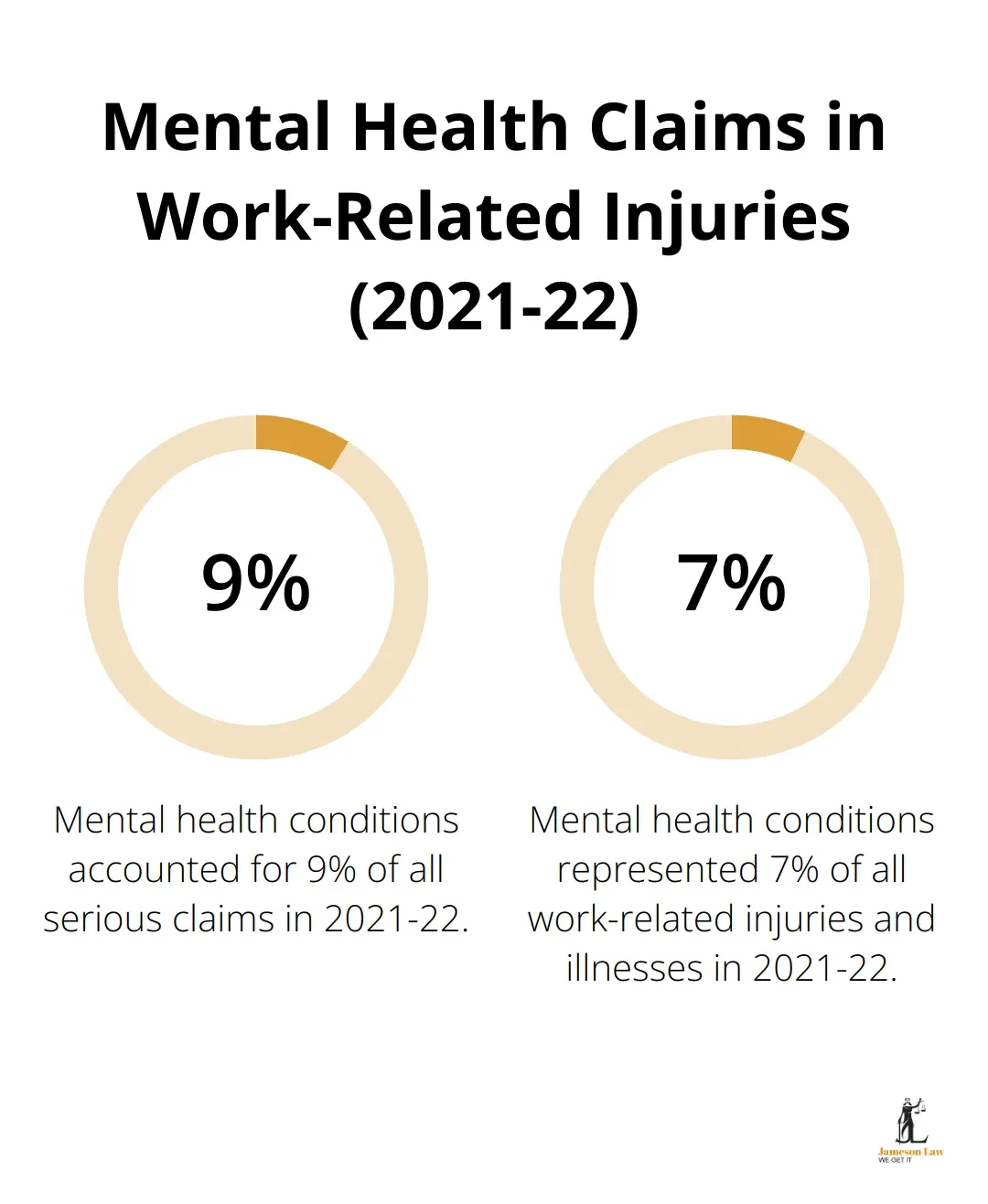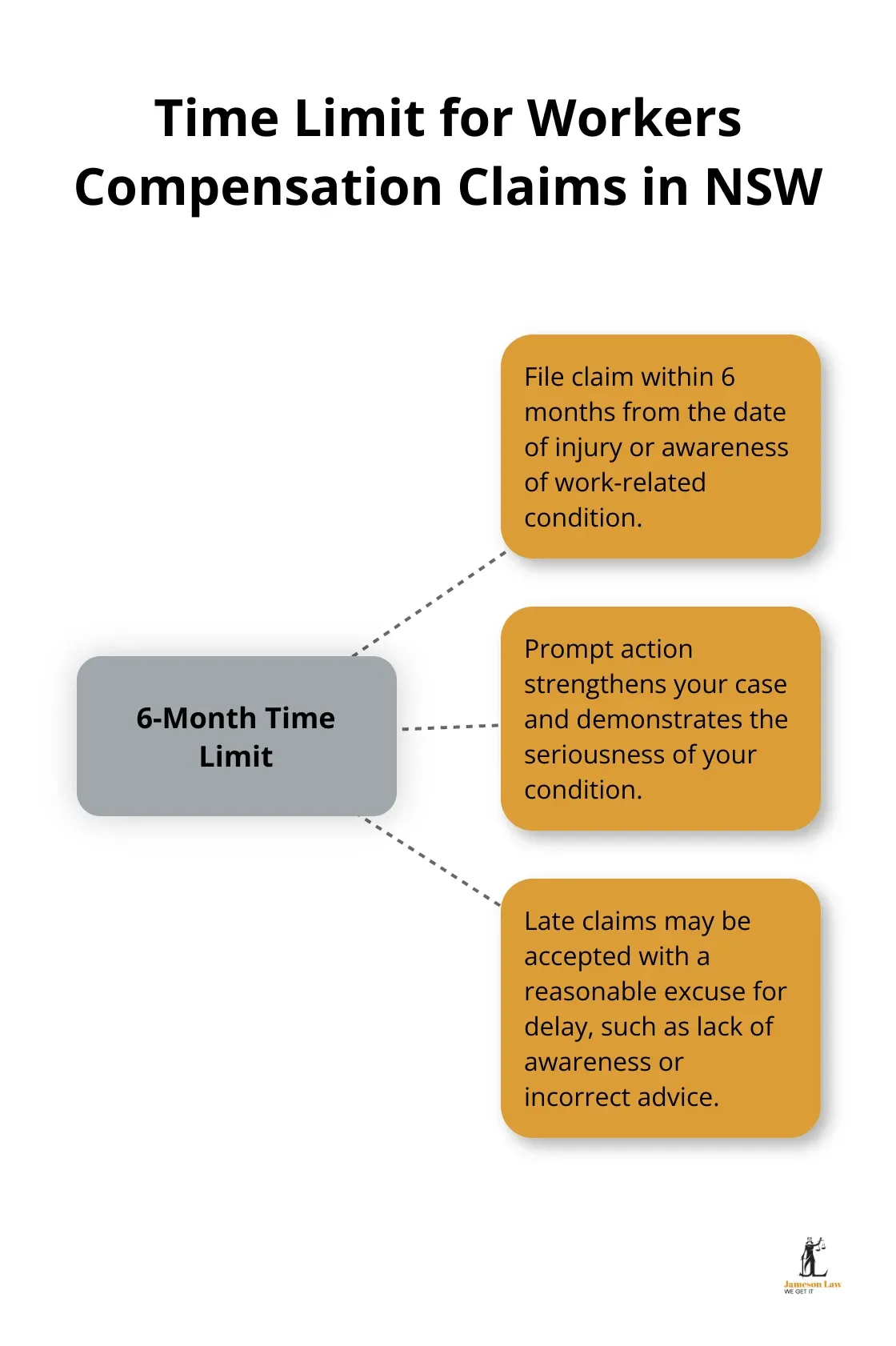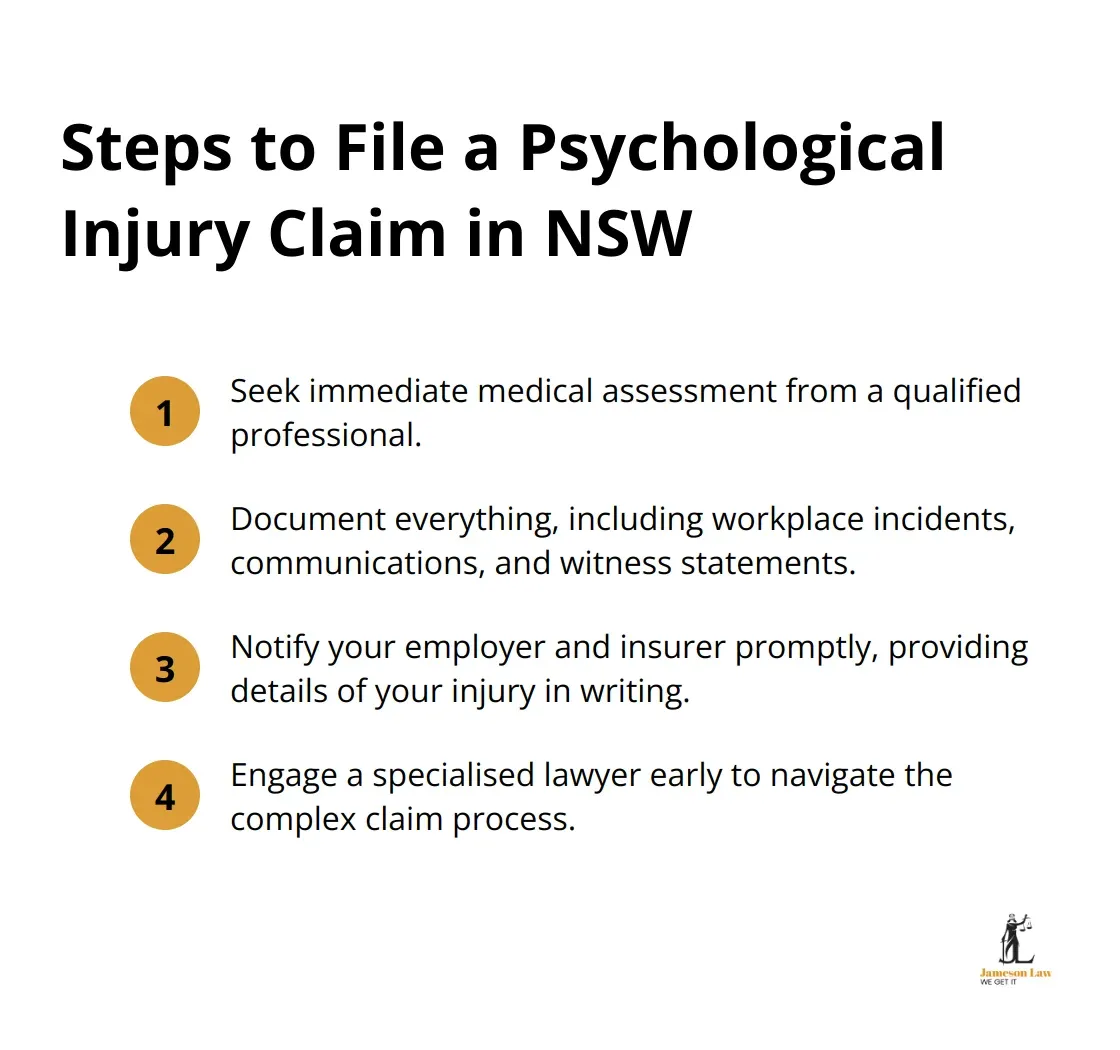Psychological injury claims in NSW can be complex and challenging to navigate. At Jameson Law, we understand the intricacies of these cases and the impact they have on individuals’ lives.
Our guide will walk you through the essential steps to make successful psychological injury claims in NSW, from understanding eligibility requirements to gathering crucial evidence.
What Are Psychological Injury Claims in NSW?
Defining Psychological Injuries Under NSW Law
Psychological injury claims in NSW represent legal actions taken by workers who have experienced mental health issues due to their employment. These claims continue to rise, with 11,700 serious claims for work-related mental health conditions reported in 2021-22.
In NSW, the law defines a psychological injury as a diagnosable mental health condition that occurs due to or during employment. This definition sets the standard for what qualifies as a compensable injury. The Workers Compensation Act 1987 (NSW) requires that for disease-type psychological injuries, employment must be the primary contributing factor.
Common Workplace Psychological Injuries
Post-Traumatic Stress Disorder (PTSD), depression, and anxiety top the list of frequently claimed psychological injuries in NSW workplaces. These conditions often result from work-related factors such as bullying, harassment, excessive workloads, or exposure to traumatic events. According to recent data, mental health conditions accounted for 9% of all serious claims and 7% of all work-related injuries and illnesses in 2021-22.

Physical vs. Psychological Injury Claims: Key Differences
The primary distinction between physical and psychological injury claims lies in the burden of proof. Psychological injuries present more challenges in substantiation due to their invisible nature. While physical injuries often manifest through scans or visible symptoms, psychological injuries require extensive documentation from mental health professionals.
Furthermore, the causation aspect undergoes more intense scrutiny in psychological injury claims. Claimants must prove that their work substantially contributed to their condition, which becomes complex when personal life stressors also play a role.
The Importance of Medical Evidence
Successful psychological injury claims often hinge on the quality and comprehensiveness of medical evidence presented. It’s not uncommon for insurers to initially reject claims, making the appeal process a critical stage. This is where expert legal representation can significantly impact the outcome of a claim.
The Role of Workplace Factors
Work-related factors play a significant role in psychological injury claims. These may include (but are not limited to):
- Excessive workloads
- Lack of support from management
- Workplace conflicts or toxic environments
Employers have a duty of care to provide a safe working environment, which extends to psychological safety. Failure to address these factors can strengthen a worker’s claim for compensation.
As we move forward, let’s examine the eligibility requirements and essential steps for filing a successful psychological injury claim in NSW.
Meeting Eligibility Requirements for Psychological Injury Claims
Establishing Work-Related Causation
To succeed in your psychological injury claim, you must prove that your work was the main contributing factor to your condition. This requires you to show a direct link between your job duties or workplace environment and your psychological injury.
For instance, if you claim work-related stress, you need to demonstrate that specific work factors (such as unreasonable deadlines or a hostile work environment) directly led to your condition. It’s insufficient to simply state that you feel stressed; you must provide concrete examples and evidence of how work contributed to your mental health issues.
Substantial Contribution from Employment
The Workers Compensation Act 1987 (NSW) sets a high bar for psychological injury claims. You must prove that your employment was the “main contributing factor” to your injury. This requirement is more stringent compared to physical injury claims, where work only needs to be a “substantial contributing factor.”
To meet this standard, collect evidence such as:
- Detailed work logs showing excessive hours or unreasonable demands
- Emails or communications demonstrating workplace conflicts or bullying
- Witness statements from colleagues who can attest to the work conditions
- Performance reviews or feedback that might have contributed to your stress
Personal life stressors won’t necessarily disqualify your claim, but you’ll need to show that work issues outweighed these factors in causing your condition.
Time Limits and Prompt Action
In NSW, you generally have six months from the date of injury to lodge a workers compensation claim. For psychological injuries that develop over time, this period starts from when you first sought medical treatment or became aware that your condition was work-related.
Don’t wait until the last minute. The sooner you file your claim, the stronger your case will be. Prompt action demonstrates the seriousness of your condition and makes it easier to establish a clear link to your employment.
If you’ve missed the six-month window, you may still be able to make a claim if you can provide a reasonable excuse for the delay. This could include not being aware of the severity of your condition or receiving incorrect advice about your rights.

Importance of Professional Legal Guidance
Each psychological injury claim is unique and complex. Professional legal guidance can significantly impact the outcome of your claim. A skilled lawyer can help you navigate the intricacies of the law, gather compelling evidence, and present your case in the most effective manner.
With the eligibility requirements clear, let’s move on to the practical steps you need to take to file a successful psychological injury claim in NSW.
How to File Your Psychological Injury Claim
Seek Immediate Medical Assessment
The first step in filing a successful psychological injury claim in NSW is to seek medical assessment and treatment as soon as you become aware of your condition. SIRA has developed guidelines for claiming workers compensation to support, inform and guide workers.
Select a medical professional with experience in work-related psychological injuries. While general practitioners can provide initial assessments, specialist psychiatrists or psychologists offer more detailed evaluations. These specialists produce comprehensive reports that clearly link your condition to your work environment (a key element for your claim).
Document Everything
Thorough documentation forms the foundation of a strong psychological injury claim. Personal injury investigations are helping shape NSW Workers’ Compensation reforms through trauma-informed methods. Record dates, times, and names of individuals involved in any workplace incidents that contributed to your condition.
Gather all relevant workplace communications, including emails, memos, and performance reviews. These provide context and evidence of workplace stressors. If possible, obtain statements from colleagues who have witnessed the conditions or incidents that led to your psychological injury.
Notify Your Employer and Insurer Promptly
In NSW, you must inform your employer of your injury as soon as possible. This notification should be in writing and include details of your injury and how it occurred. Your employer then has five days to notify their insurer.
Some employers might attempt to downplay your condition or suggest it’s not work-related. Stand firm and insist on your right to make a claim. The insurer has 21 days to make an initial decision on your claim, so prompt notification is essential.
Engage a Specialised Lawyer Early
While not mandatory, engaging a lawyer who specialises in workers’ compensation and psychological injury claims can significantly improve your chances of success. Professional legal representation significantly improves your chances of navigating complex workers’ compensation laws and securing fair compensation.
A skilled lawyer helps you gather the right evidence, meet deadlines, and present your case in the most compelling manner. They also represent you in any disputes with the insurer or at the Workers Compensation Commission if necessary.

Expert legal representation often makes a substantial difference in psychological injury claims. A competent legal team guides you through every step of the process, ensures your rights are protected, and helps you receive the compensation you deserve.
Final Thoughts
Successful psychological injury claims in NSW require a strategic approach and thorough understanding of the legal landscape. We explored critical elements, from establishing work-related causation to meeting strict eligibility requirements. Prompt action is vital – seek immediate medical assessment and notify your employer as crucial first steps.
Documentation strengthens your case. Gather comprehensive evidence, including medical reports, workplace communications, and witness statements. This detailed record demonstrates the link between your work environment and your psychological condition (a key element for your claim).
The complexity of psychological injury claims in NSW highlights the importance of expert legal guidance. At Jameson Law, we specialise in personal injury cases and understand the nuances of NSW workers’ compensation laws. Don’t navigate this complex process alone – contact us to gain a dedicated ally in your pursuit of justice and fair compensation.













